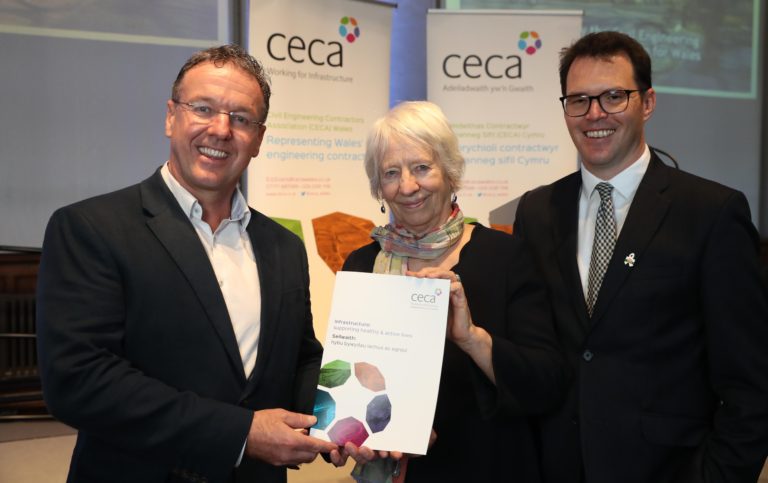Covid-19 and the way we’ve had to react to “lockdown” in Wales and, more specifically, the instructions not to travel unless absolutely essential has brought many things to a sharp focus. There’s been much talk of how we don’t want to return to the rush hour commute and all that wasted time spent in traffic queues, how we want to maintain better air quality, how we want to reduce carbon emissions, how we want to lead healthier and more active lifestyles and how we should focus more on active ways of getting to work or, for some, don’t travel at all, just work from home. Balanced against this is the difficulty of maintaining social distancing on public transport and the potential to drive more people towards their cars – if active travel is not an option. So how do we stop ourselves from going back to behaving exactly as we did before this pandemic?
Let’s not forget that the last few months have seen exceptionally dry and sunny weather. A huge proportion of the population has been off work, schools have been closed, people have been forced to stay local and, subliminally, daily exercise has almost become a “treat” for people, an experience which they value highly. With these conditions it should be no surprise that we’ve seen so much walking and cycling and so little car use.
But what happens when the restrictions have been lifted, when the weather is not so good, when schools are back and when more people need to travel to work. We will obviously need to see huge cultural changes across all sectors of society, not least in the way we do business. But we will also need to rethink the infrastructure we need to support our lives and to maintain social distances – particularly if we are to pursue more active and healthy lives.
Rethinking our infrastructure is nothing new, particularly when driven by public health crises. We’ve almost become trapped in a mindset that it’s only the economy that drives infrastructure investment. In reality, if you look at some of the major innovations in infrastructure they’ve been health related. The introduction of sewerage systems and improved water treatment and distribution facilities in Victorian times was all about tackling the public health challenges of cholera and other diseases.
And in the 21st Century one of our major health concerns in the West, pre-pandemic anyway, is obesity. Whilst medical interventions are needed, in reality, it will be infrastructure improvements that will drive and support long lasting change. And the same is true as we plan for a post-Covid future.
Uncannily, last year we, along with colleagues from the public and private sectors, published a report titled “Healthy and Active Lives: the role of infrastructure”. The drivers for the report were numerous: increasingly difficult funding challenges across the public sector following almost a decade of austerity measures, an ageing population, mounting pressures on the NHS and increased demands for infrastructure to encourage and allow us to lead healthier and more active lives.
The report, which looked at the challenges and opportunities for the infrastructure sector, was launched in the Senedd hosted by Jenny Rathbone MS and where we were joined by the Deputy Minister for Economy and Transport, Lee Waters, MS, and a number of Members of the Senedd from across the political spectrum as well as stakeholders and partners from the sector and beyond. Little did we know at that time that within a few months we would be hit by a global pandemic with the potential to drastically transform the way we live our lives.

The Covid-19 crisis has highlighted the need to urgently consider the issues that we raised in the report and our recommendations for a plan of action. In my foreword to the report I said that “the time is right for a step change in the way we view transport infrastructure and what it can achieve. What we need is leadership, political will to act across Wales, both locally and nationally, and a fundamental rethink of the way we promote, fund and deliver our priorities.” The challenge was how to inject some urgency into this and get people to change their behaviours. A big part of me wasn’t overly optimistic. However, our response to this pandemic has shown what society can achieve in a relatively short space of time if we are all focused on the need for change.
And the key questions from the report?
Is stronger political leadership required?
Yes. But this isn’t about a whinge. This isn’t about trotting out the usual thing about “Welsh Government need to do this, that and the other” which at times is an excuse not to do something. To be fair the government has been very clear about the direction of travel and has legislated for it. Investment was being made but progress was slow and that’s why we were asking for much greater impetus and direction from other tiers of government – local authorities and health boards in particular. Because integrating health, wellbeing and transport policies, particularly at a local level, is a major undertaking that goes against the grain of traditional practices.
And it takes strong political will and leadership to tackle this at all levels. But haven’t we seen this leadership in the last 3 months?
What evidence do we need to justify investment?
If we’re going to change our “active travel culture” for the long term then we need a major shift in attitude not just from those who travel but from those who fund infrastructure. We need to rethink the way we justify investment and base it on the Wellbeing of Future Generation Goals. We need to cost the health benefits of investing in transport infrastructure alongside decarbonisation, economic performance and other factors. And we need the evidence to back this up.
Who pays?
We make it very clear that current funding structures need to be overhauled – we need to challenge who pays and who benefits. A small fraction of the health budget should help fund infrastructure projects to encourage active travel and deliver health benefits. This was true before the pandemic but our experiences of dealing with Covid-19 have made this even more obvious.
Who will take responsibility?
An integrated approach needs collaboration, of course. But realistically someone needs to take responsibility (and be accountable) for connecting public sector “silos” and coordinating policy delivery:
- A role for the Welsh Government in bringing the various parties together to help kick start things
- What about regional arrangements impacting the transportation debate? Possibly but the jury’s still out on how useful the Growth Deals will be and the Public Service Boards have yet to prove their value.
- Isn’t and all-Wales body such as Transport for Wales (TfW) well placed to ensure that local transport schemes align with the active travel agenda? Arms length of government and, yes, they have a lot on their plate at the moment but they do need to move on from just talking trains.
Either way, the issue of leadership needs to be settled before any real progress can be made otherwise progress will continue to be fragmented.
How can we win hearts and minds?
Much of the practical change will take place at local level, so it’s crucial that local authorities, local health boards, residents, private businesses and other local stakeholders are engaged and on board.
But there needs to be a shift in culture, behaviours and attitudes within the private sector as well. Businesses need to play a much stronger role, alongside the public sector, in showing what can be achieved through working differently, reducing our obsession with the costly and dirty daily commute and embracing digital technology to work remotely.
Wellbeing is rightly at the heart of the Welsh agenda as we move forward into a future shaped by the Wellbeing of Future Generations Act. Infrastructure has a really important part to play in promoting healthy and active lives. In fact, I’d argue that the sector’s role is crucial. So many health issues can be traced to our transport networks and the way we conduct our daily lives. Our focus on car use, especially in urban areas, at the expense of public transport and active modes of travel has led to rising volumes of traffic, increased air and noise pollution, safety concerns, challenges for walkers and cyclists, community disconnect and social isolation for many. And our response to the pandemic has shown what we can do particularly in terms of our use of digital technology to aid communication and engagement – move the data around rather than the people!
All this will need better infrastructure whether it be to support transport or improve communications.
So, our 4-point plan of action is actually an offer to our partners to:
- Review our post-Covid19 transport needs and agree and drive forward an integrated transport policy that champions active travel and healthier living
- gather evidence and research to help make the case for active travel investment as being in line with the Wellbeing Goals and reflective of a new way of justifying investment post-Covid19.
- let’s better integrate the planning and funding of active travel initiatives across health and transport portfolios – identify and break down the barriers that prevent this happening locally and remove any bureaucracy that fails to add value
- support the “mainstreaming” of good practices in active travel across the infrastructure sector – if I was coming at this from a “what can CECA Wales and infrastructure partners most contribute to” it would be this one
We know that, given the economic impacts of Covid-19, sourcing investment in major infrastructure programmes will be challenging, but the way we identify and prioritise our investment needs to change to reflect our health needs as well as our economic priorities. Despite having an Active Travel Act we’ve struggled to make significant advances in five years. Attitudes within our sector also need to change.
A few weeks before the pandemic really got a grip of Europe we held a conference (80 people in a room in central Cardiff, remember those days?) to refocus on our plan and move it forward. The rest is history, but given that the Welsh Government has just launched a consultation on a new 25 year transport strategy it feels like an opportune moment to revisit this and to influence and drive change. It’s also interesting that the Deputy Minister for Economy and Transport, Lee Waters MS, recently announced an invitation to local authorities to transform Wales’ transport system with measures such as temporary cycle lanes, pavement widening and speed restrictions – considering examples introduced in places like Milan and Berlin in response to quieter roads. This challenge for Councils to change Wales’ transport environment is obviously linked to the coronavirus lockdown but the outcomes would support our aspirations to live healthier and more active lives into the future.
As a nation we’re at a bit of a crossroads to say the least. But the pandemic has shown that when we really do need and want to effect changes we can do so quickly. The danger is that, despite all the fine talk around changing lifestyles, changing work practices and changing our view of the world, we end up taking the lazy route and slip back into the slow lane. We mustn’t let that happen. We must all take responsibility for making the changes. And we must invest in our infrastructure to support us to make those changes.
Ed Evans
Director, Civil Engineering Contractors Association (CECA) Wales

